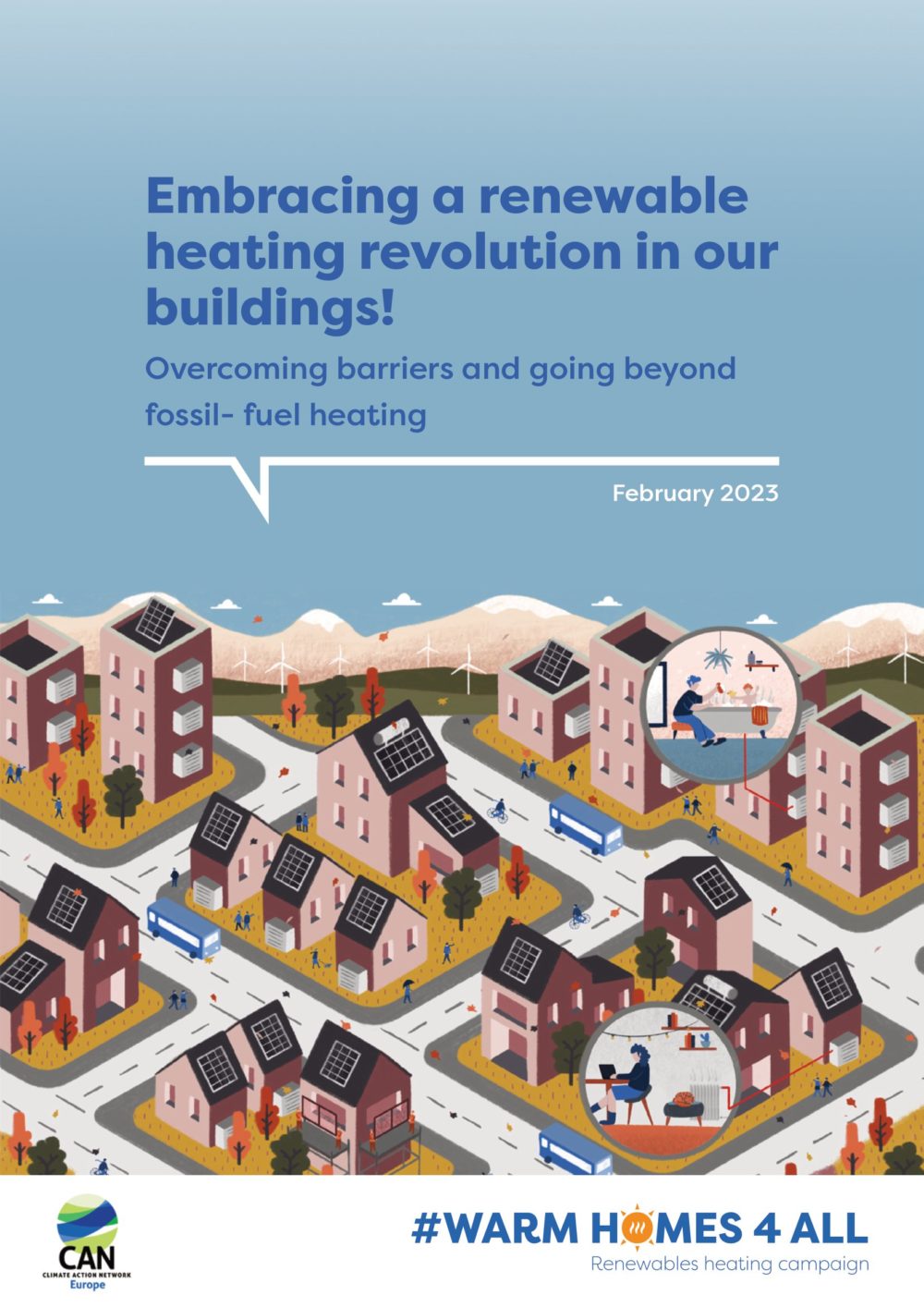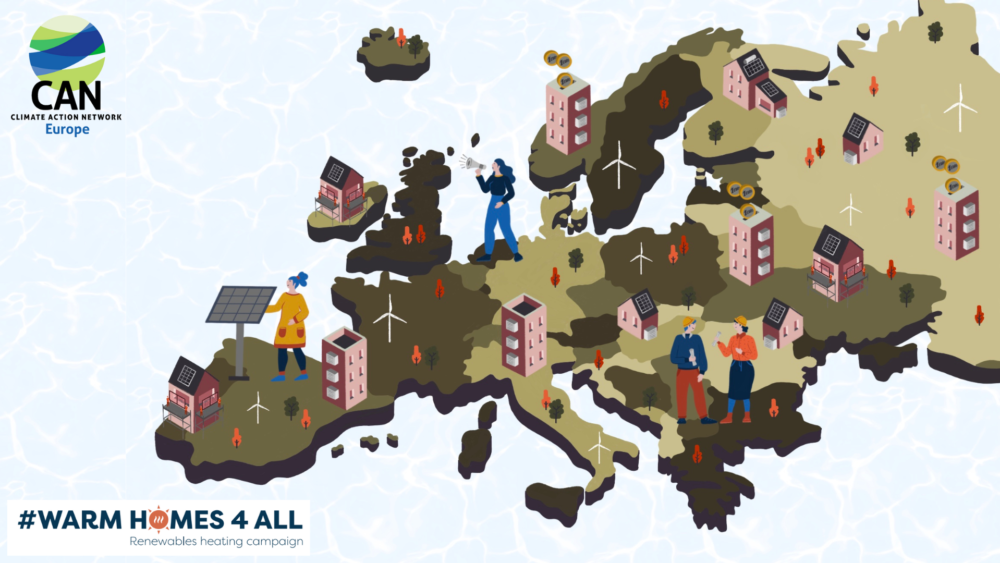CAN Europe’s launches a new report on renewable heating, which finds that ineffective EU and national policies are not keeping up with demand as homes and businesses look to reduce their energy consumption and cut down on costs and emissions. Despite the urgent need to wean off fossil fuels and increase energy savings, many economic and non-economic barriers still exist on both the demand and supply side.

Heating decarbonisation has gained enormous attention from experts and policymakers lately. In March 2022, following the Russian invasion of Ukraine, the International Energy Agency mentioned “accelerated heat pump deployment” as part
of its 10-point plan to reduce dependence on Russian gas. In May 2022, the European Commission suggested in its REPowerEU Plan doubling the rate of installation of heat pumps in Europe before 2030. The Plan also recommends, via its EU Save Energy Communication, that 2029 be set as an end-date for the sale of stand-alone fossil fuel boilers, and 2025 for the end of subsidies for the installation of such technologies and encouraging redirection to incentivise support schemes for heat pumps instead.
At the national level, some European countries are setting different sorts of heating decarbonisation targets. On the ground however, progress is slow and hampered by a number of obstacles. Economic and non-economic barriers exist on the demand side (users), on the supply side (manufacturers, installers), and also on the political side. Such barriers make the switch to renewable heating solutions (e.g. renewable energy based-heat pumps, solar thermal and district heating networks using renewable sources) an obstacle course for even the most motivated citizens, and results in slow progress at the societal level. If the barriers are not addressed, Europe risks missing its energy and climate targets; the transition to a 100% renewable energy system and climate neutrality, while Europeans will stay locked-in to the volatility and high prices of fossil fuels for years to come.
District heating, despite being a key solution for maximising energy efficiency potentials and stepping up heating systems’ decarbonisation, still accounts for only a very limited share of the market across Europe and the vast majority of district
heating networks are still reliant on fossil fuels. This is in part because district heating, a collective heating solution, requires more planning, infrastructure investment and coordination than individual solutions such as heat pumps and solar thermal panels. Also, the EU and Member States need a much stronger commitment for the deployment of the integration of renewable heating (and cooling) systems, energy savings and efficiency improvements in dwellings in a combined and integrated way, to tap the potential of the combined strategy to reduce our dependence on fossil fuels.
For a summary on these barriers and solutions to Europe’s renewable heating transition, please find our factsheet here.
You can read the Bulgarian version of the report here.
You can read our press release here.
“Sustainable renewable heating solutions are already available across Europe, but change isn’t happening fast enough. When it comes to the ongoing fossil fuel crisis, the elephant in the room is the heating installations running on fossil fuels, leading to rising levels of greenhouse gas emissions and energy poverty. If we are to protect the people and the climate in winters to come, clear policy objectives, more financial support, a skilled workforce and easy access to independent information for all, are essential to transform European countries’ outdated heating systems to renewable and efficient models.” – Mónica Vidal, Renewable Heating campaigner at CAN Europe.
“The awareness of the need to switch from fossil fuels to renewable options in heating of buildings increased significantly with the rise of energy prices in 2022. Although there are several plans for energy refurbishment of buildings in Croatia, no comprehensive planning for heating decarbonisation exists. For citizens to be able to install new heating systems based on renewable energy, clear funding options are needed as well as the support to the most vulnerable households to avoid (energy) poverty and deepening class differences.” – Maja Bratko, Senior Expert, Society for Sustainable Development Design (DOOR)
It is very important that member states take responsibility when it comes to heating decarbonization. A ban on new fossil boilers in buildings is the first step to ensure that we work against an oil and gas lock in the heating sector. Meaningful support schemes for district heating and heat pumps can push a fast fossil heat phase out. – Julie Abrahams, policy officer, Green Transition Denmark.
Energy efficiency is a strategic key option for lowering energy prices, increasing energy security and tackling energy poverty. Although Italian fiscal supporting schemes for buildings’ renovations represent an advanced example at European level, they are affected by temporal instability, regulatory fragmentation and weak effectiveness. in order to make energy efficiency and heating decarbonization good options for economic growth and energy security, a long-term planning for building decarbonization coupled with an adequate financial support mechanism is needed. – Francesca Andreolli, Researcher, ECCO think tank.
There are a plethora of reasons to embrace the transition to renewable heating, especially given the current international context. We all have heard by now how important it is to become energy independent, but that’s only the tip of the iceberg. This transition will bring us closer to achieving our climate goals and will have direct consequences on European citizens improving our health and comfort, business competitiveness, and saving money in our energy bills. Energy efficiency is key and many options are already available in the market to enable citizens to take advantage of it. In order to boost this transition, many barriers have been identified and action from not only public administration, but also citizens and industry. – Daniel Sanz, Project Manager, ECODES.




